What is the difference between a German Shepherd and a Siberian Husky? Are they similar breeds or not? Which one is better for me and my family’s lifestyle? How about their temperament, size, shedding, and grooming needs?
What are some other things to consider when picking out your next pet dog breed? Check out this blog post as we compare these two popular breeds side-by-side.
We’ll answer all of those questions plus more below! This blog post will help you decide which type of dog would be best for you.
History of the German Shepherd and Siberian Husky
The German Shepherd originated in 1899 in Karlsruhe, Germany. They are known for being one of the most intelligent breeds out there!
Their primary use is serving as working dogs because they are loyal, protective, confident, and good-natured dogs with strong leadership skills.
The Chukchi people in north-eastern Siberia bred the Siberian Husky. They are one of the oldest breeds around, dating back to 3000 B.C!
The Siberian Husky is a working dog that can survive in harsh climates. They are brave, outgoing, and very athletic dogs that are natural pack animals with strong hunting instincts.
Siberian Husky vs German Shepherd Appearance
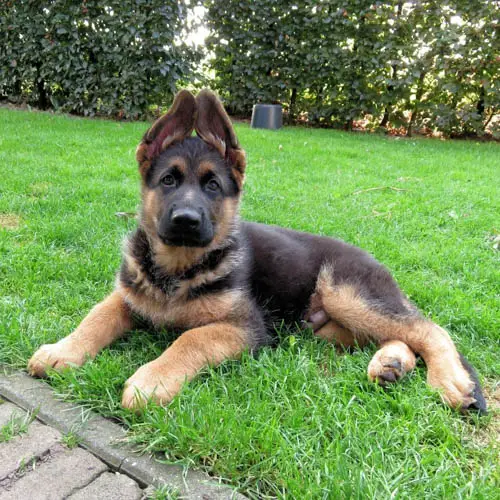
Identifying the two breeds is relatively easy. For example, Siberian Huskies are bigger dogs with pointier ears, while German Shepherds are smaller dogs with rounder ears.
However, these differences aren’t always apparent to all dog owners or potential owners. So let’s compare some of the other physical traits of each breed.
German Shepherd vs Siberian Husky Size & Height
Both breeds are large, but German Shepherds weigh more than Huskies. The average adult male German Shepherd weighs from 66 to 88 pounds (30-40 kg) and stands 24 to 26 inches tall (60-65 cm).
The average adult male Siberian Husky weighs anywhere from 35 to 60 pounds (16-27 kg) and stands 20 to 23 inches tall (51-58 cm).
German Shepherd vs Siberian Husky Grooming
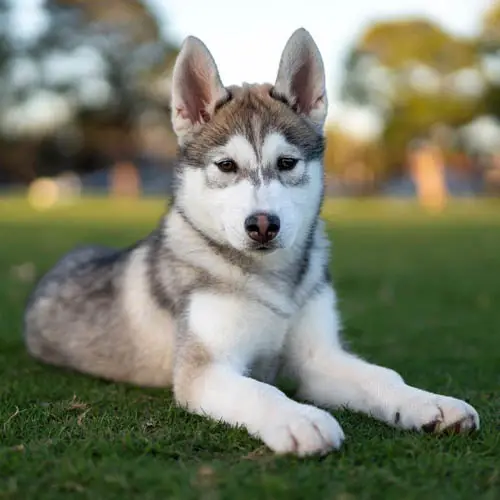
Both dogs shed, but there is no comparison between the Husky and the German Shepherd when shedding. Huskies frequently shed during the spring and fall, but German Shepherds constantly shed, even in the winter.
The Siberian Husky requires weekly brushing, whereas the German Shepherd requires brushing once every four days. The German Shepherd has a very dense double coat, so it can withstand harsh weather conditions.
However, it sheds twice a year, so you’ll have to brush it more often during shedding seasons. They, like all canines, need their nails maintained regularly.
German Shepherd vs Siberian Husky Temperament

Siberians are well-known for their intellect and self-reliance. They are highly loving and perfect for family life, but they aren’t clingy. Despite their potential to learn, huskies are difficult to teach and may be mischievous.
Therefore they’re best left in the hands of confident, experienced dog owners. They are pack dogs; therefore, they need a leader to be in charge of the pack.
Meanwhile, German Shepherds are intelligent, powerful, and busy dogs that make wonderful companions. Shepherds are popular with families because they are easy to train and enjoy a task and are used to aid disabled persons, function as police dogs, and save avalanche victims.
Shepherds are good family dogs, but they are not overly sociable when they meet someone and do not readily warm up to strangers. They can also serve as excellent watchdogs because of their aloofness.
Huskies, on the other hand, are poor watchdogs. They may appear ferocious with their wolf-like countenance, but the breed is quite amiable. They aren’t overly noisy, either.
They prefer to howl rather than bark, which may be annoying for some people. Huskies, like other dogs, can be naughty when they are bored or don’t get enough exercise.
If left unsupervised, they love to dig and can wreak havoc on gardens and even parts of the house if not kept in check. They’re also known for being “escape artists,” which means they’ll stray from home if given the opportunity.
German Shepherds require a significant amount of physical activity and mental stimulation. They’ll act out, chew things, and bark if they’re left alone for lengthy periods, are bored or dissatisfied.
Also, as with every other breed, German Shepherds require appropriate chew toys—they enjoy chewing and will quickly destroy your favorite pair of shoes with their powerful jaws.
Siberian Huskies are curious dogs that have a high prey drive. They will follow their noses in the direction of nearby activity, so they should be kept in fenced-in yards or watched carefully when outside.
Siberian Huskies also require adequate exercise because they were bred to work in teams each day, which means owners need to make sure these dogs get enough exercise, or they can quickly become bored and act out.
German Shepherd vs Siberian Husky Health Problems
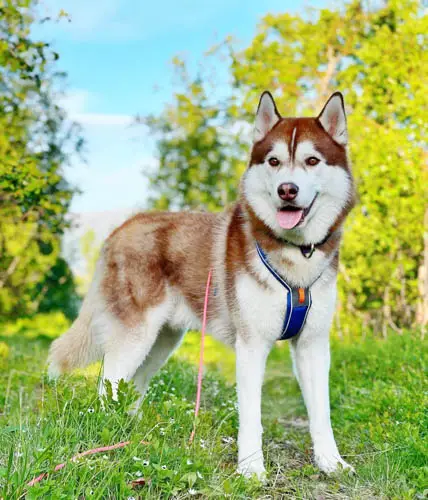
The German Shepherd is a genetically susceptible breed for several health problems, including entropion, elbow dysplasia, bloat or gastric torsion, hip dysplasia, osteochondritis dissecans (OCD), panosteitis (growing pains), degenerative myelopathy, epilepsy, and autoimmune disorders.
Siberian Huskies, like many purebred dogs, are susceptible to hip dysplasia and genetic eye conditions. They may also inherit diseases that afflict the Siberian husky breed, including epilepsy, corneal dystrophy, progressive retinal atrophy (PRA), Cushing’s syndrome, Addison’s disease, parasitic dermatitis, and lupus.
German Shepherds are more predisposed to hip dysplasia than Siberians are. They can be susceptible to degenerative myelopathy, epilepsy, canine cancer, autoimmune disorders, Addison’s disease, OCD, bloat, or gastric torsion (twisting of the stomach that may cause fatal results) entropic eyelids.
Siberian Huskies tend to live 15 years or more, whereas German Shepherds typically live 10 to 13 years.
German Shepherd vs. Siberian Husky Diet
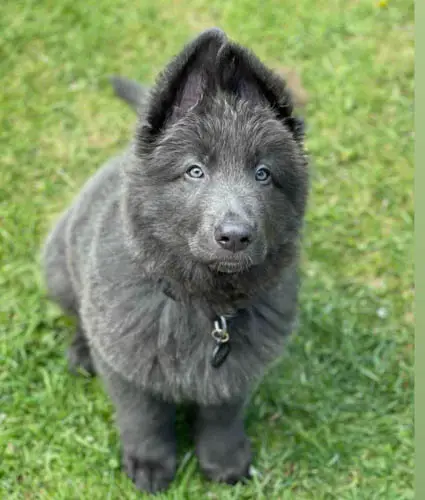
German Shepherds eat a lot, but they can become overweight if not exercised or fed properly. Owners of large dogs tend to feed their pets more than smaller dog owners do because it may take a great deal of food to satisfy a German Shepherd’s appetite.
A typical adult Husky weighing 60 pounds (27 kilograms) needs about 1,650 kcal/day and a daily protein requirement of about 54 grams (based on a caloric density of 3.5 kcal/gram).
A big difference between the two breeds is that Huskies, like many dogs belonging to the working group, require more dietary protein than most other dogs (around 30% – 40% of total calories). German Shepherds need less dietary protein (15% – 25%) and more dietary fat, a more appropriate balance.
German Shepherd vs Siberian Husky Exercise
Siberian Huskies are not usually served by apartment living because they require sufficient exercise daily. They may adjust to life in an apartment if there is a large yard or park nearby where the dog can run for 30-45 minutes every day.
On the other hand, German Shepherds need lots of open space to run and play to stay physically and mentally healthy. They need at least an hour of exercise every day and should never be chained up in a yard without access to shelter, food, or water.
Both breeds are smart dogs that enjoy mental stimulation require regular training sessions to keep their minds sharp and alert. German Shepherds thrive on obedience training, and Siberian Huskies excel at dog sports, such as agility and sledding.
Several hours of exercise every day will keep German Shepherds happy and healthy, and Siberian Huskies that don’t get enough exercise or stimulation may become hyperactive and destructive.
German Shepherd vs Siberian Husky: Trainability
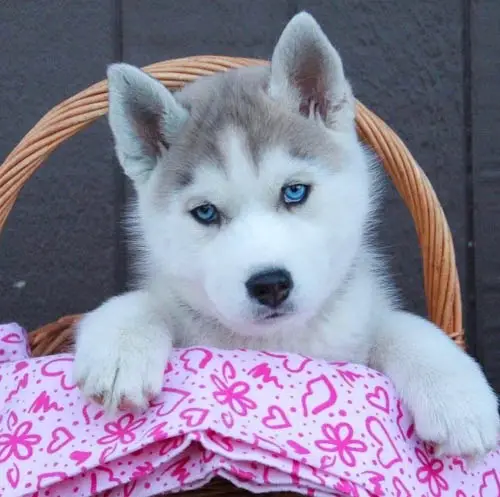
Both breeds are intelligent, but they have different personalities and working styles. German Shepherds are more likely to follow a set training program, especially when introduced by an authority figure such as a police officer or breeder/trainer.
This breed is alert and responsive to commands from its owner, and owners must be firm with these dogs because they tend to get protective of their food and territory.
Huskies, on the other hand, tend to be less obedient and more independent-minded than German Shepherds. They do not respond well to heavy-handed training techniques; verbal corrections and positive reinforcement work best with this breed.
Siberian Huskies can become hyperactive if they don’t get enough exercise, so training sessions should be energetic and fun to keep them engaged.
It’s critical to socialize puppies from a young age, but it’s especially crucial for different reasons for the German Shepherd and Siberian Husky. The German Shepherd, a natural guard dog, needs to be introduced to all kinds of people and situations early on to learn not to be suspicious of strangers.
This breed is often wary of other dogs. It will need constant socialization with big and small breeds during puppyhood because bigger dogs may intimidate or hurt them if they don’t learn how to behave around other animals.
Siberian Huskies are not aggressive by nature, so they do not need to be socialized with people as much.
However, this is an excellent breed for active kids because the dog will love playing keep-away games with them in the yard or park – but it’s important to monitor children when they are together because Huskies can become aggressive with other dogs.
German Shepherd vs Siberian Husky: Popularity Ranking

The American Kennel Club ranks the German Shepherd as the 8th most popular purebred dog in America, whereas the Siberian Husky is ranked 44th. Because of their working dog roots, both breeds are generally more popular in urban and suburban settings.
There are many similarities between the German Shepherd and Siberian Husky, but also significant differences that should be taken into consideration by any prospective owner.
The German Shepherd is a versatile breed that makes an excellent guard dog, police K-9 companion, or guide dog for people with disabilities; this breed can be easily trained to perform complex tasks.
On the other hand, the Siberian Husky is more independent-minded and requires lots of exercise every day; it’s an ideal sled dog for cold climates but can also be an excellent family pet in the right environment.
German Shepherd vs. Siberian Husky: Family Interaction
Both breeds are highly affectionate with adults but can be wary of strangers. Huskies are better for families with older children since the breed is less likely to nip or bite if it feels threatened.
The German Shepherd will readily defend its family from intruders and should be monitored around small children because the dog may not distinguish between playful and aggressive actions during puppyhood.
These breeds are very intelligent, so they can be challenging to train without using positive reinforcement methods.
Both breeds are natural guard dogs and will not back down from a challenge; therefore, it’s important to give these puppies plenty of exercises and stimulate their minds with training sessions daily. These working breeds love to be challenged and will get bored if the same tasks are performed repeatedly.
German Shepherd vs. Siberian Husky: Price
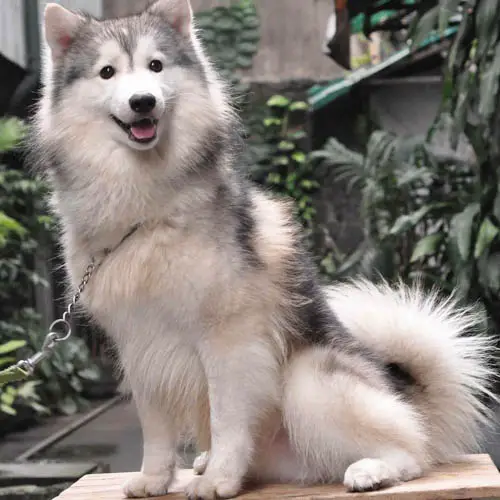
The average cost of buying a German Shepherd is $1,000 to USD 1,500. The price can be higher for puppies with an impressive show background or desirable genetic traits (intelligence and good health).
Siberian Huskies are generally cheaper than German Shepherds because they are not as popular; the average cost of buying one is $500 to USD 1,000.
Tips on How to Find the Suitable Dog for You
There are hundreds of different dog breeds globally, and each one has its own set of unique characteristics. If you want to find the best breed for your lifestyle, consider some important factors – including size, temperament, energy level, grooming requirements, and ease of training – before making a final decision.
The German Shepherd is an excellent guard dog, but only if it is raised and trained properly. If you’re looking for a protective dog that can also be obedient and trainable, this may be the best breed for you.
However, consider getting a Siberian Husky instead if you need an energetic dog to keep up with your physically demanding lifestyle.
Conclusion
German Shepherds and Siberian Huskies are both great breeds of dogs. If you’re considering adopting one, make sure to keep in mind their different temperaments and personality traits that may affect your lifestyle or living situation.
For example, if you live in an apartment with little outdoor space, a husky is probably not the best option for you because they need more exercise than other dogs. However, if what’s important to you is making friends on walks around your neighborhood, then a german shepherd will be perfect!
Which do you prefer? We hope this article has helped clear up some confusion about these two breeds so that when it comes time for choosing which breed will fit into your life best – there won’t be any surprises.





